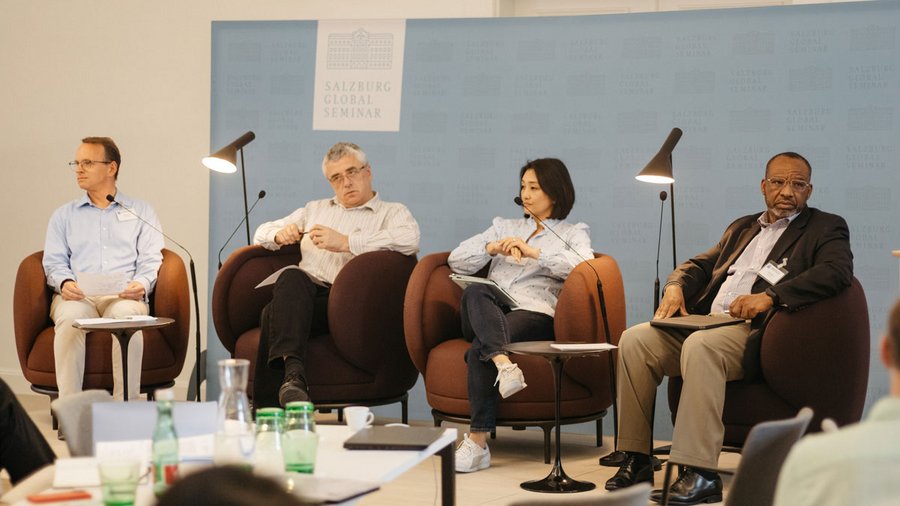The Salzburg Global Finance Forum started off with topical conversations around global responses to an emerging and growing global carbon market
The 12th annual Salzburg Global Finance Forum kicked off with a panel, Carbon Pricing and Carbon Trading: Policy Considerations, examining the role of carbon as a new asset class and tracing what kind of growth trajectory it can plot, as a global carbon market expands.
Fellows – new and returning – from around the world came together to the first in-person Forum since 2019, held just ahead of the 75th anniversary celebrations of the Salzburg Global Seminar. Broadly themed Shaping the Future of Finance: Carbon Markets and Pricing, Digital Money and Financial Regulation, the three-day program saw Fellows engage questions, discussions, and analysis of strategic challenges and emerging risks.
In the context of the threats climate change poses to the social, political, and economic landscape of the world as we know it, the panel held a frank and robust discussion offering insights into how different parts of the world are playing their part in managing carbon, and what a just carbon world will look like.
Moderated by Amelie Champsaur, partner at Cleary Gottlieb, the panel’s speakers included Martin Moloney, secretary general of The International Organization of Securities Commissions (IOSCO), William McDonnell, COO of The Integrity Council for The Voluntary Carbon Market, Kumi Kitamori, acting deputy environment director and head of green growth at the OECD, and Daniel Mminele, head of the Presidential Climate Finance Task Team in South Africa.
“We looked at how to link markets across jurisdictions,” Martin told Salzburg Global after the panel, which focused its discussion around voluntary and compliance markets, carbon pricing instruments, and the specifics around carbon trade, including credits and allowances.
“A lot of the market activity is a good sign, but further regulatory harmonization is needed and again on measurement and assessment of different allowances and credits, especially in the voluntary markets,” said Kumi.
Honoring the Paris Agreement
William McDonnell spoke to the importance of prioritizing frameworks set out in the Paris Agreement, emphasizing that the goals require “some disruptive change” globally.
“There was a lot of consensus here that the world economy needs to transform rapidly,” William said after the panel. “And a lot of that is connected with reducing emissions very fast. And so we need to stay very focused on the role of the carbon markets to help accelerate that alongside helping to develop renewables.”
For William, the most important thing is that in the medium term, markets accelerate reductions. And Kumi Kitamori agrees. “We don't have time to lose anymore. We have to really ramp up efforts and cut emissions in the next 7 to 8 years,” she said. “If we are to meet targets by 2030, that's less than a decade.”
All panelists agreed that in conversations around compliance and voluntary markets, country-specific circumstances need to remain central. Despite climate change being universal, the roles and stakes of developing countries vary greatly from those in the Global North.
“Our purpose is helping the voluntary carbon markets accelerate a just transition to 1.5 degrees. And the just transition includes these concepts of helping to finance climate action that's needed in the Global South,” emphasized William.
A just transition
Speaking from the context of an “energy-precarious” country, Daniel Mminele highlighted the example of how South Africa – highly reliant on coal for electricity, a resource that is in high demand, with the country facing rolling power cuts dubbed “load-shedding” – faces an energy crisis, but is still an active player in a discussion about energy transitions.
“The African continent is a very low contributor to global emissions, but finds itself now on the receiving end of very strict prescripts and policies that are right in reducing emissions, but that need to take into account our starting point that are actually the culprits for where we are sit elsewhere, and that they have used fossil intensive development to get to the levels of prosperity that they enjoy,” he said.
At COP26 in November 2021, an agreement called the Just Energy Transition Partnership (JETP) was established for countries such as France, Germany, the United Kingdom and United States. The aim is to mobilize an initial amount of $8.5 billion to support South Africa’s transition from coal to renewable energy sources. “We understand as Africans, we want to contribute to the global good, but are saying that we need help and we need that support,” said Daniel.
The richness of a discussion drawing from global perspectives from people working across the board left Fellows energized for an exciting Finance Forum, promising to impart knowledge of current, topical matters.
“I think what was really good about this discussion was the combination of people who were in the room,” concluded Martin Moloney. “We had a number of experts in here on carbon markets, but we also had a lot of people who were really trying to come to grips with something that is new to them.”


